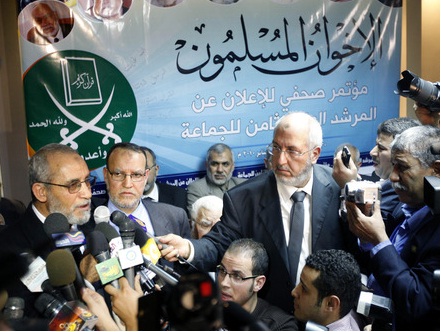Editor’s Note – The Muslim Brotherhood is fast tracking the move to take over Egypt. The date of the elections is not confirmed and the Coptic Christians remain threatened and panicked due to corruption in all sectors. Broken foreign policy began with our very own State Department and is now leading to a radical Islamic State in Egypt, which was held at bay for years by the fall from grace of Hosni Mubarak.
Deal to Hasten Transition in Egypt Is Jeered at Protests
CAIRO — Egypt careened through another day of crisis with no end in sight as hundreds of thousands of people occupying Tahrir Square jeered at a deal struck on Tuesday by the Muslim Brotherhood and the military that would speed up the transition to civilian rule on a timetable favoring the Islamist movement.
The agreement, which centered on a presidential election by late June, appeared unlikely to extinguish the resurgent protest movement — the largest since the ouster of President Hosni Mubarak nine months ago. The crowd roared its disapproval when the deal was announced at 8 p.m., fighting spiked on the avenue leading to the Interior Ministry, and the number of protesters continued to swell.
Unlikely to satisfy the public demands for the military to leave power, the deal may have driven a new wedge into the opposition, reopening a divide between the seething public and the political elite, between liberals and Islamists and, as events unfolded, among the Islamists themselves.
“We refuse it, and the square has refused it already,” said Islam Lotfy, a former leader of the youth wing of the Muslim Brotherhood who was expelled from the organization with a group of others for starting a centrist political party. “They did not offer anything new. They are just bargaining with the people.”
Just four days ago, the Muslim Brotherhood kicked off a wave of protests against the military’s increasingly explicit attempts to decree for itself special powers and protections under the future constitution. But when a heavyhanded crackdown on demonstrators ignited a far broader and more violent backlash against the military’s power grab, Brotherhood leaders sent mixed signals about whether to join the swelling protests. And while other political groups called for a huge demonstration on Tuesday, the Brotherhood ordered its members to stay away for fear of jeopardizing elections as the violence hit a peak.
The Health Ministry said 31 people died in four days of unrest, and more than 600 were injured on Tuesday alone.
For the military and the Brotherhood, the deal was the closest embrace yet in the off-again-on-again partnership since the revolution between the country’s two most powerful institutions — reprising roles played out under Mr. Mubarak, who outlawed, but tolerated, the Muslim Brotherhood during his three decades in power.
For Egyptian liberals, the open deal between the two most powerful and organized forces in the nation raised fears of being caught between groups at odds with their goals: a military reluctant to submit to democratic oversight, and an Islamist movement with a potentially narrow view of individual freedoms.
“Pessimists fear the Saudi scenario,” Shady el-Ghazaly Harb, a liberal activist, said recently, referring to the possibility of imposing both strict Islamic moral codes and a harshly undemocratic government.
The agreement was worked out in a meeting held by Gen. Sami Enan, a top leader of the military council, who invited all of the major political parties and their leaders. Most liberal parties and leaders, including the presidential contender Mohamed ElBaradei, declined to attend, as did the moderate former Brotherhood leader Abdel Moneim Aboul Fotouh, another presidential contender. All said that negotiating with the generals would confer legitimacy on their authority and that the solution to the crisis should come from the protesters in the street.
Of the roughly 10 parties and leaders that met with General Enan, the Brotherhood was easily the most influential. For the Brotherhood, the accord promises to achieve a critical goal, by beginning the first parliamentary elections in the post-Mubarak era on Monday, as scheduled; the Brotherhood’s newly formed Freedom and Justice Party is poised to reap big gains from its advantages in outreach and organizing. And with those gains in the new parliament, the Brotherhood would be able to help shape the writing of a constitution.
For the military, the deal would allow it to retain unfettered authority at least until late June. Many liberals and Islamists had grown concerned in recent months about the military’s increasingly overt effort to preserve a decisive role for itself in politics far into the future.

